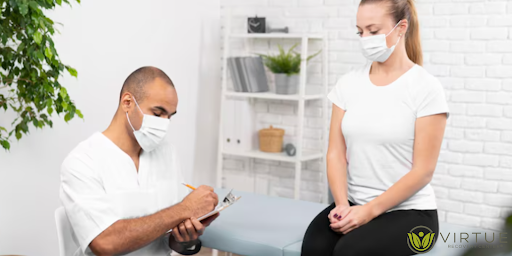Key Takeaways
- A free drug evaluation can help you see if marijuana use is becoming a problem.
- Cannabis can cause dependency, even if it’s often seen as harmless.
- Professional evaluations guide you toward the right kind of help.
- Serious cases might benefit from Houston’s inpatient rehab.
- Recovery is easier with counseling, healthy routines, and support from others.
Introduction
For some people, marijuana is just something they try in college or use on weekends to relax. For others, it slowly turns into a daily habit they depend on, maybe to sleep, maybe to calm anxiety, or just to feel “normal.”
If you’ve tried cutting back and found it more complicated than you thought, you’re not alone. That’s where a free drug evaluation near me can help. It’s not about shaming or blaming, it’s about understanding your situation and figuring out the next step toward feeling more in control.
How Can a Free Drug Evaluation Near Me Help?

Think of a drug evaluation like a heart-to-heart conversation, but with someone who’s trained to spot the early signs of trouble. You share your habits, your challenges, and how marijuana fits into your life. They listen, ask a few questions, and help you see things more clearly.
A free drug evaluation near me can:
- Point out signs of cannabis use disorder you might not have noticed.
- Recommend options like counseling or group therapy.
- Give you a plan that works for your lifestyle and comfort level.
The CDC reports that nearly 3 in 10 marijuana users develop some form of dependency. If you’re part of that group, the earlier you take action, the better your chances of breaking the habit.
What Are the Signs of Marijuana Dependency?
Dependency doesn’t mean you’re lazy or weak; it just means your body and mind have adapted to the substance. Some signs that marijuana use may be crossing the line include:
- Needing more weed than before to feel the same effect.
- Using it multiple times a day without thinking.
- I’m trying to quit, but I always go back.
- Missing work, school, or social events because of it.
- Using it as your main way to deal with stress, sadness, or boredom.
If you’re nodding along to more than one of these, a free drug evaluation near me might be a good next step.
Why Is Quitting So Hard?
A lot of people think marijuana is “easy to stop.” But your brain can become used to the effects, and without it, things might feel…off.
You might notice:
- Feeling irritable for no reason.
- Trouble sleeping or vivid dreams.
- Less appetite.
- Cravings that sneak up when you’re stressed.
Research from the National Library of Medicine explains that these withdrawal symptoms can pull you back in even if you want to stop. That’s where things like therapy and group support can make a big difference.
When Is Houston Inpatient Rehab a Good Idea?
Sometimes, outpatient help isn’t enough, especially if marijuana use is tied to deeper issues like anxiety, trauma, or other addictions. That’s when Houston’s inpatient rehab can be life-changing.
Houston inpatient rehab offers:
- A safe, trigger-free environment.
- 24/7 medical and emotional support.
- Individual and group therapy sessions.
- Skills to handle life without relying on marijuana.
Think of it as hitting the reset button in a place designed to help you succeed.
Can Marijuana Mess with Sleep and Mental Health?
Sure, marijuana can help you relax in the moment. But in the long term, it can have the opposite effect. According to PubMed research, marijuana use, especially heavy or daily use, can mess with your REM sleep, the stage where your brain recharges and processes emotions.
And if you struggle with anxiety or depression, heavy marijuana use can sometimes make it worse. The YouTube video The Effect of Marijuana on Your Sleep breaks down how quitting may cause short-term restlessness, but over time, your natural sleep patterns can improve.
What Does Recovery Look Like?

Recovery doesn’t look the same for everyone. For some, it’s simply replacing marijuana with healthier stress relief. For others, it means therapy and support groups.
Most recovery plans involve:
- Counseling to uncover what’s driving your use.
- Group therapy for shared understanding and accountability.
- Healthy lifestyle changes include regular exercise, a balanced diet, and engaging in hobbies.
- Avoiding triggers that make you want to use.
The first step is almost always a free drug evaluation near me, because it gives you a clear picture of what kind of help you might need.
Conclusion
Marijuana dependency can sneak up on you. One day it’s just for fun, and before you know it, it’s part of your daily routine. But it doesn’t have to stay that way. A free drug evaluation near me can help you understand your current situation and your goals.
Whether you need simple counseling, group therapy, or even Houston inpatient rehab, there’s support out there for you.
If you’re ready to take the first step, call Virtue Recovery Houston at 866-457-4811 or contact us online. You don’t have to figure this out alone.
FAQs
Can marijuana be addictive?
Yes. While it’s not as physically addictive as some substances, it can still cause strong mental and emotional dependence.
What happens during a free drug evaluation?
You’ll talk privately with a trained professional who will ask about your usage, lifestyle, and goals. They’ll help you figure out your options.
How does marijuana affect sleep?
It can interfere with the deep stages of sleep, and quitting may cause short-term insomnia, but over time, sleep quality usually improves.
Will I need rehab if I’m dependent on marijuana?
Not necessarily. Many people do well with outpatient therapy, but inpatient rehab is there for more severe cases.
Resources
- Centers for Disease Control and Prevention. (2023). Cannabis Use Disorder. Retrieved from https://www.cdc.gov/cannabis/health-effects/cannabis-use-disorder.html
- Budney, A.J., et al. (2017). Marijuana Dependence and Its Treatment. National Library of Medicine. Retrieved from https://pmc.ncbi.nlm.nih.gov/articles/PMC5531365/
- Babson, K.A., et al. (2019). Cannabis, Cannabinoids, and Sleep: A Review of the Literature. PubMed. Retrieved from https://pubmed.ncbi.nlm.nih.gov/30933714/








